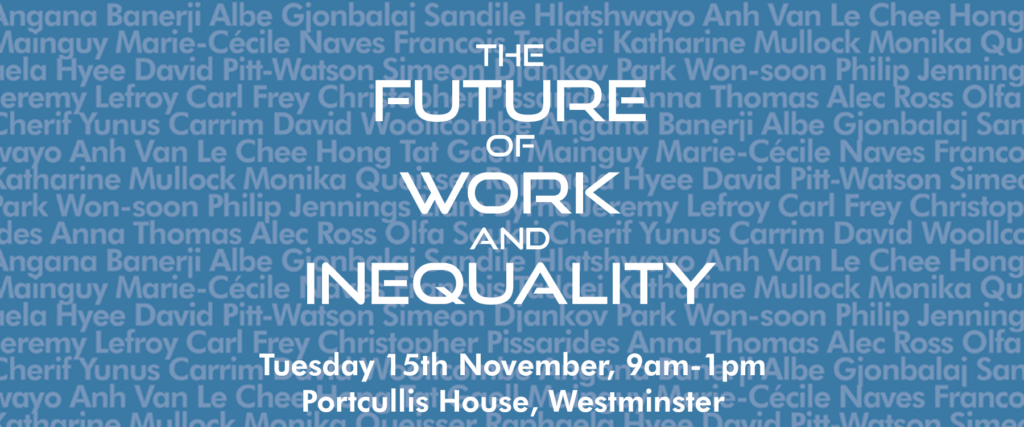Helping New Businesses Capitalise on the Future of Work
Encouraging innovative, new firms will be a key strategy for connecting the potential of new technology with the business of actually providing jobs. That will often mean policymakers pioneering new ways for government to help. Olfa Soukri Cherif MP, Vice-Chair of the World Bank and IMF Global Parliamentary Network explains.
Helping New Businesses Capitalise on the Future of Work
This essay is included in the new book from the Parliamentary Network on the World Bank and IMF: The Future of Work for the People we Serve. To sign up for the launch of the book as well as a conference on the future of work and inequality, click here!

Olfa Soukri Cherif MP
The future of work is part of a broader debate across our region as the fourth industrial revolution changes the way we relate to each other, the work we do, the way our economies work, and what it means to be human. In the Arab world there is increasing urgency towards capitalising on these changes by embracing the innovation of startups and entrepreneurs.
This revolution is transforming practically every human activity: the way we make things; the way we use the resources of our planet; the way we communicate and interact with each other as humans; the way we learn; the way we work ; the way we govern; and the way we do business. It is not just about technology or business – it’s about society.
Today, we see our methods of working changing, thanks to the development of information and communication technologies that make it possible for actors across fragmented organisations to transfer and exchange data, to communicate information and knowledge unconstrained by the limits of time and space.
In companies, managers and their employees are trained to adapt to these technological changes to continue to fulfil their missions, achieve their objectives and create value. At the same time, the manager, both subject and object of our problem, must accompany these changes and adapt the new modes of operation of its employees, initiated by the needs and constraints of remote communication through information and communication technologies.
This inventory of companies in communication with one another opens many fields of research around the uses, logic of appropriation, social representations, processes of communication, co-actions, cooperation, collaboration and collective intelligence, methods and management and motivation tools for women and men at a distance.
Over recent years, we have observed these transformations, focusing on the impact of information and communication technologies on human behaviour in business, health, education and politics.
As members of parliament, we represent citizens and serve the people. Considering the systemic complexity of the environment has led us to take an interest in the different approaches to initiate the essential for the jobs of the future and to encourage youth entrepreneurship. Tunisian policymakers, post revolution, have to focus on how to create jobs for young people.
So, what can we do to help ?
The starting point should be education. A learning process that continues throughout life, to adapt and to work flexibly alongside a career, will be vital – as will technical, social, and critical thinking skills.
Second, we must set up policies that encourage the private sector to generate more jobs. This means the public sector have to invest in transport and digital infrastructure. To this end, the Tunisian Government helps young people start their own enterprises and links small businesses and farmers to larger markets.
Third, encourage an ecosystem for start ups. Innovation is a multi-dimensional phenomenon that constitutes a creative synthesis between the worlds of knowledge and technology and the vast expectations of society. The design phase is a magical moment where the vision of the project materialises into a concrete proposal : the fruit of the entrepreneur’s sensitivity, imagination, and inspiration.
In the battle of ideas, Tunisia is climbing up the top-50 in the 2017 Bloomberg Innovation Index, which ranks economies and measures the impact of innovation by multiple factors such as research and development spending and the concentration of high-tech public companies.
Tunisia’s Startup Act is notable not just for the important steps forward the country is taking to build a thriving entrepreneurship ecosystem, but also because this is the first time in the Arab region that startups have successfully lobbied policymakers to change the laws that affect them. Hopefully we will see similar success in other countries across the region.
Leave a Reply
Leave a Reply